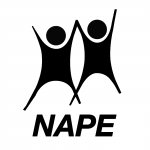An introduction to National Association for Primary Education – NAPE 004
THE WAY WE WORK FOR PRIMARY EDUCATION
The National Association for Primary Education (NAPE) brings together everyone who has a concern for the learning of children from birth to 13 years. Members and affiliated schools work to improve education through the Early, Primary and Middle Years.
- All are welcome as members; Heads, Teachers, Teaching Assistants, Parents, School Governors. Inspectors, Administrators and entire School Communities.
- Members have an important voice exercised democratically. We influence public opinion and regular meetings are held with government ministers. The association is totally neutral politically.
- There are meetings of members both locally and nationally. Local associations can be formed.
- Conferences and workshops are arranged both locally and nationally.
- The association is administered by an elected National Council meeting termly to review progress and discuss national issues. Detailed administration is delegated to an Executive Committee which reports to the Council.
- NAPE is a prominent member of the Primary Umbrella Group which brings together all organisations working in the primary sector including subject associations and unions. This is a new and rapidly developing field of work which is facilitating cooperation and partnership.
- All aspects of education are experienced by children in their primary schools and we have strong links with subject associations.We often engage in cooperative ventures with them.
The National Association for Primary Education speaks for young children and all who live and work with them.
Our principles
The National Association for Primary Education speaks for young children and all who live and work with them.
Our aim is to achieve a higher priority for the education of children from birth to 13. High quality learning in the early years of life is vitally important to the creation of an educated society. Young children are not simply preparing for the future, they are living a never to be repeated time of life and the best way to learn is to live.
Primary schools should be centred upon the characteristics of childhood. The children are not miniature adults and they see their expanding world, think about it, develop ideas and acquire skills to deal with it in distinctive ways appropriate to their early development.
Teachers who specialise in the education of the young should be trusted to use their judgement in matching learning to the individual needs and responses of the children. They have a vital role alongside the child in supporting and structuring learning. Underlying primary pedagogy is the knowledge that young children learn best through their own fully sensory experience. Ideas are drawn out of personal experience and then held in the mind. Skills, which are always based upon ideas, are best learned in action as they are needed in life.
An invitation to join us.
Because everyone who shares time with a young child is to some degree a teacher our membership is open to all who are in broad agreement with our principles. We believe in a strong and continuous partnership between parents and teachers. Members become part of a national network which has effective links with all other voluntary associations working to improve the quality of early and primary education.
Teachers, heads, parents, carers, students, school governors, teacher trainers, nursery nurses, teaching assistants, administrators and consultants — all are welcome.
Belonging
The network’s activities are expanding both locally and nationally. Members are kept in touch through our newsletter, NAPENews and the journal, Primary First which is posted direct to members and available both in paperback and on-line. The NAPE website is updated regularly and critical comment including members’ views on current issues are publicised. We are fully involved in Twitter and Facebook and post regular podcasts. Conferences and Trade Fairs attract substantial attendances. The National Office maintains a 24/7 telephone helpline and a members’ directory so contact is always available. The journal is the only exception to the maintenance of communication by telephone and on-line. The prime focus of our work is in line with our principles, that is to say the education and upbringing of children in their earliest years and not the bureaucracy which invades current life. Administration, kept as simple and swift as possible is undertaken by volunteers who serve pro bono on the National Council and the Executive. Members who feel able to contribute to the smooth running of the association are elected or co-opted to serve on the Council.
Undoubtedly, membership of NAPE enhances and contributes to the professionalism of all who join us.
|
Where We Stand Making Our Voice Heard Members alongside the children in their schools can be confident that the association is speaking for them and that the view from the classroom is vitally important in shaping NAPE’s position when we are representing primary education.
Membership benefits include:
|
|
Contact Us NAPE National Office Moulton College Moulton Northampton NN3 7RR E: nationaloffice@nape.org.uk T: 01604 647646 www.facebook.com/NAPEofficial @N_A_P_E Visit us online at: www.nape.org.uk Join online at: www.nape.org.uk/how-to-join Reg. Charity Number: 289645: a partnership to promote the education of children from birth to 13 As mentioned on the podcast |

